Week Ahead: Markets Hold Breath for Employment and Fedspeak
2022.11.27 11:17
[ad_1]
- Fed is the only game in town
- Employment data especially significant at this time
- Bad economic data should cause a rally
Except for mega caps, none of the four major U.S. indices made new highs last week, even though they all advanced.What are the investors anticipating?
The Fed’s preferred inflation gauge, the, as well as data on manufacturing and spending will be available during the week.Yet, the most effective report could be that of . A series of Fed speakers could potentially move markets because the data matter in the context of monetary policy.
One of them is Federal Reserve Chairman Jerome Powell, who is scheduled to speak on Wednesday at the Brookings Institution about “the economic outlook and the labor market.”
The Fed boss has been keeping aggressively due to his focus on data, as the event’s title indicates: On November 2, the Federal Reserve raised interest rates by a record-high 0.75 percent, bringing them to their highest level since 2008.Although they are not magicians, the Federal Reserve has come under fire for allegedly wanting Americans to lose their jobs.
It is an employee’s market with full employment and the highest wages when there are almost two job openings for each applicant. People’s demand for goods and services rises as a result of job security and the expectation that it will continue to exist. Therefore, the Fed must keep raising rates until the employment market declines if it is to remain consistent. November will see 200,000 new jobs, down from 261,000 in October, according to consensus.
A “substantial majority” of members, as reported in the meeting minutes published on Wednesday, believe that it would “likely soon be appropriate” to temper the sharp increases. This desire may be bolstered or compelled to continue accelerating rates by a change in employment data on Friday.”Just” a 0.5 percentage point increase at the upcoming Fed meeting on December 13 and 14.
Powell’s assertions that he still sees the possibility of a soft landing raise my suspicions.Despite the fact that we have yet to see the full impact of the rate hikes, I anticipate a rough landing because the U.S. economy has virtually not expanded.
The cost of living increased by 6.2% year-over-year in September, and even by 5.1%, even as growth stagnates.When the first and second quarters ended, a technical recession began.GDP increased by 2.6% in the third quarter, primarily due to an increase in exports (though this is not always representative).
We have observed investors reacting favorably to poor economic data and selling off when the economy proves resilient because quantitative easing has replaced a natural economy that operates on participants’ supply and demand.Given that the Fed is the only player in town, I anticipate that the backward philosophy regarding our artificial economy will be even stronger now.
While each of the four U.S. measures progressed, utilities beat and innovation slacked, showing financial backer mindfulness. That is evident from the chart.
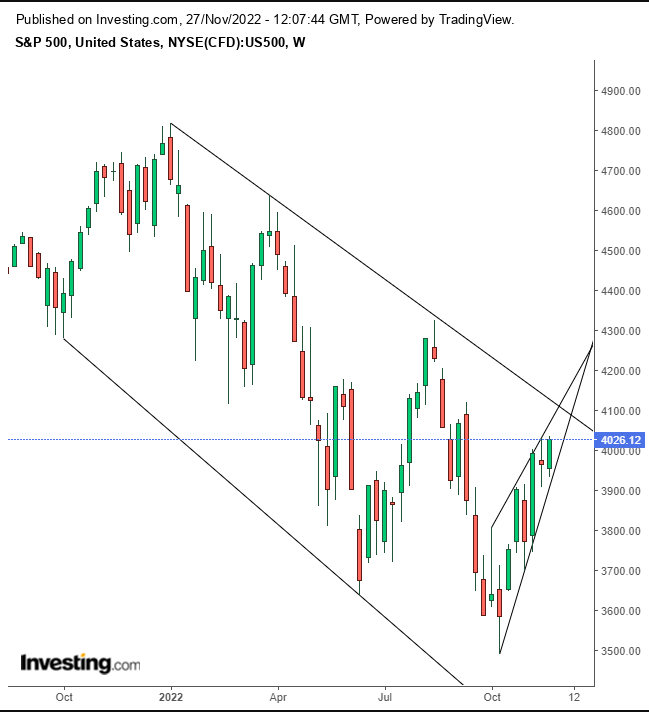
Source: Investing.com
While I included the chart, the following is true for all but the : while the weekly price climbed, it found resistance near last week’s highs. The Dow made a new high in the short-term uptrend, confirming investors are looking not for growth but for preservation.
In the S&P 500, we also see a bearish pattern developing in the short term as it possibly climaxes ahead of the falling channel top, demarcating the medium-term downtrend.
The short-term rally is characterized by a faster ascent of lows, while highs are not keeping up, forming a rising wedge. This pattern is bearish, completed with a downside breakout, as bulls grow tired of the lack of progress and exit positions.
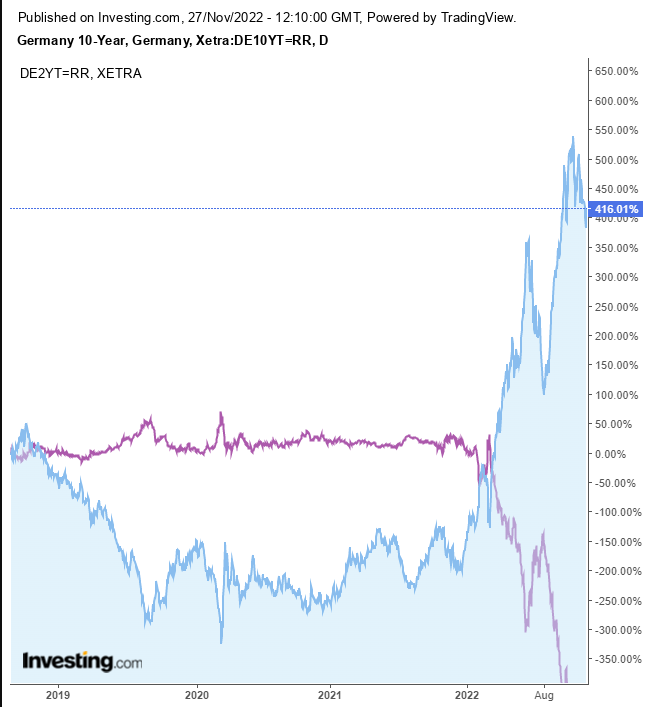 German yield curve: 10-year vs. 2-year bonds
German yield curve: 10-year vs. 2-year bonds
Source: Investing.com
The German yield curve ( vs. bonds) fell to its steepest inversion in three decades, indicating a recession, joining the inverted .
The has declined since its biggest two-day selloff on Nov. 10-11, when consumer inflation (per the ) rose 7.7% YoY in October, its slowest rate since January and lower than 8% estimates. Last week, the dollar sank further, completing a bearish pattern, after Fed minutes revealed a growing consensus to ease its aggressive path to higher rates.
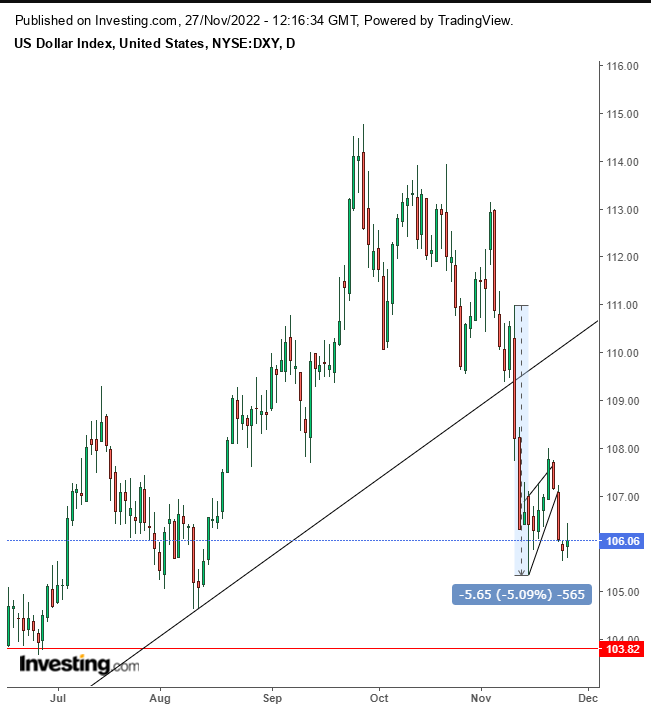
Source: Investing.com
The dollar formed a rising flag, bearish after the initial 5% plunge within four sessions, whose implied target will put to the test the 103 support of the highs since Jan 2017 (red line).
enjoyed the weakening dollar when its yield role lessened.
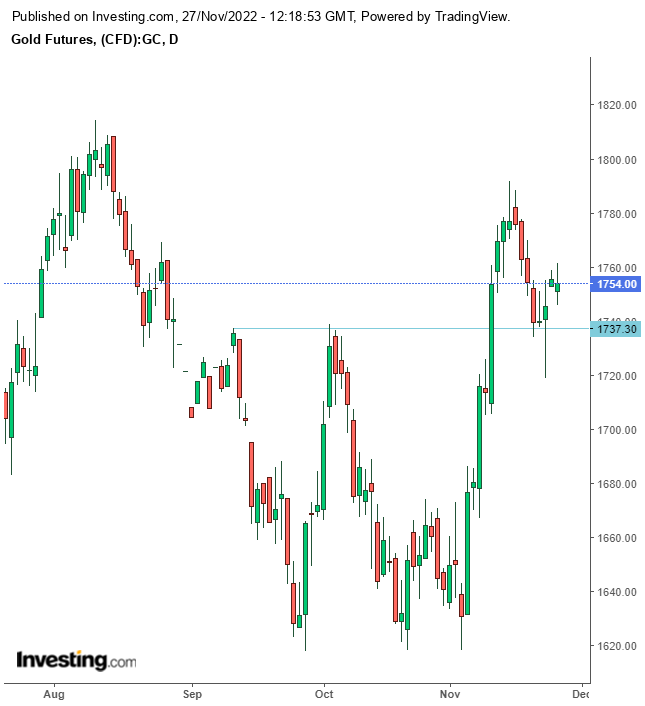
Gold Daily Chart
Source: Investing.com
Gold completed a return move, whose support confirmed the double bottom’s neckline.
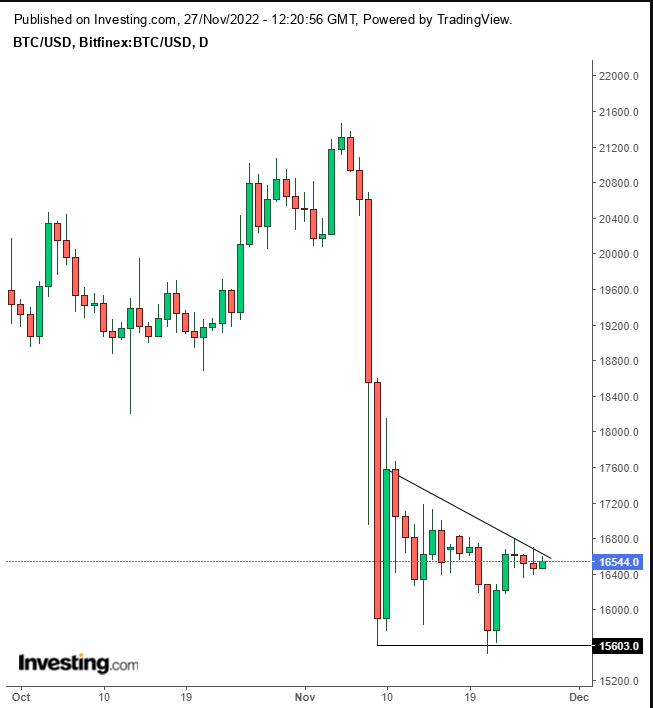
Source: Investing.com
may be forming a descending triangle, a pattern of a range that projects bears overcoming bulls. The downside breakout will imply a $2,000 drop from the point of breakout to $13,600.
As for , strictly speaking, last Monday’s lower low (red circle) confirmed the .
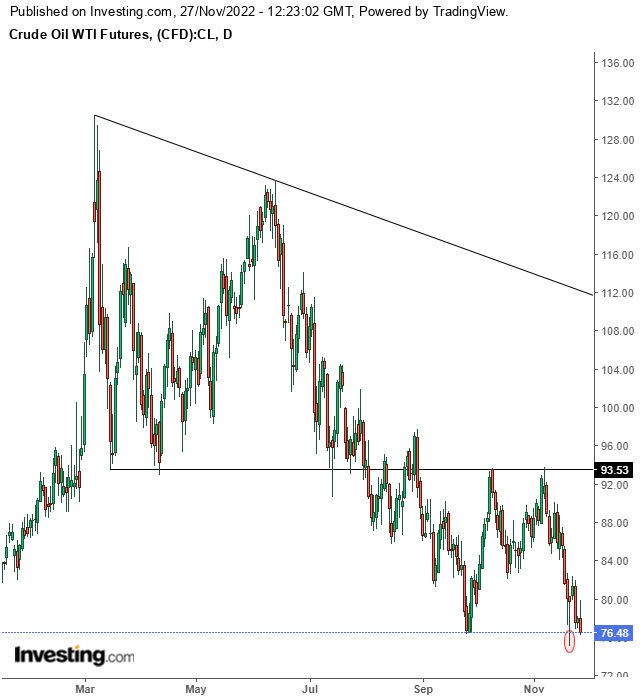
Oil Daily Chart
However, that day developed a potent bullish hammer. Therefore, wait for a fall below $75 for confirmation.
[ad_2]
Source link








